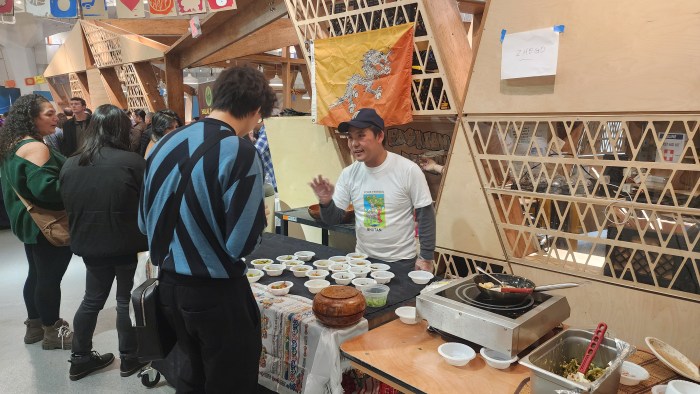By Nathan Duke
The Queens Museum of Art intends to dispel any notions that borough residents might have about post−Soviet nations in the Middle East and Central Asia with a new film series and art exhibition exploring issues of ethnic and religious identity that will be on view this summer.
The museum, located in Flushing Meadows Corona Park, will run a free film series with films from Kazakhstan, Kyrgyzstan, Turkmenistan, Uzbekistan and Tajikistan through Sept. 27. The films will screen in conjunction with “Tarjamaâ„Translation,” a contemporary art exhibit that will include video work, sculptures, photography, installations and multimedia textile works from a number of Middle East and Central Asian nations.
“These filmmakers were trying to figure out a post−Soviet reality,” said Prerana Reddy, the museum’s director of public events. “Their styles are very different — some are satirical, some more romantic, while others are tragic or coldly observational. In each case, you can see the struggle to give a snapshot of where that particular country is at that moment.”
The films, all from the 1990s, were obtained by the museum through Budapest’s Open Society Institute, which collected a number of feature movies and documentaries from post−Soviet nations at a time when their film distribution had collapsed.
“Russian culture had been imposed,” Reddy said. “Islam was banned. Farms were confiscated and collectivized. There was a lot of ecological devastation at that time and there was an influx of foreigners coming into the region. So, there was a void in terms of getting these films out. This is a rare opportunity to get a sense of these films.”
On May 30, Kazakhstan’s “Aksuat” (1999) will screen at the museum. The film follows the story of a prodigal son who returns from the city to the small village in which he grew up. But circumstances lead to his imprisonment and his brother is forced to care for his pregnant wife.
“It’s very much about the harsh landscape and its isolationist outlook,” Reddy said. “It also has much to do with rural versus urban culture and Russian versus Kazakh lifestyle.”
Kyrgyzstan’s “The Adopted Son” (1998) will screen June 27. The film is a coming−of−age story that explores the clash between modernity and traditional culture. Its story follows a teenager who finds out he was adopted and is forced to take over as head of his household.
On July 25, the museum will screen Tajikistan’s “Kosh Ba Kosh” (1993), a romantic drama set against the backdrop of that nation’s civil war in the 1990s. In the film, a man wins a woman in a dice game and the two are forced to take refuge in a mountain cabin as war breaks out.
Turkmenistan’s “Little Angel, Make Me Happy” (1992) will screen Aug. 29. The film, set during World War II, follows the story of Soviet citizens of German origin who were deported from Turkmenistan to Siberia. The lead character is a 6−year−old boy who must hide out after he is separated from his family.
“All of a sudden, the people who were his friends and neighbors are now his enemies,” Reddy said. “It looks at how being German in that place in time changed who belonged and who didn’t belong.”
On Sept. 27, the museum will screen Uzbekistan’s “The Orator” (2000), a black comedy about a cart driver forced to care for his brother’s three wives after he dies. The Bolsheviks hire him as a propagandist after they discover he is a good public speaker.
Each film will screen at 1 p.m.
The movies will screen in tandem with the museum’s art exhibition, which will feature contemporary works by 23 artists from Kazakhstan, Iran, Israel, Turkey, Lebanon, Egypt, Germany, the United States, Iraq, Afghanistan and Palestine.
“Each artist will be a translator who conveys something specific and personal that might not be what people normally know about these regions,” Reddy said. “It’s very timely, especially when thinking about America’s presence in that region.
The museum will also hold its annual Passport Fridays outdoor film festival near the park’s Unisphere this summer. Selections will be from Uganda, Venezuela, Colombia, Mexico, India and Taiwan.
Read film reviews by Nathan Duke at criticalconditions.net.



































